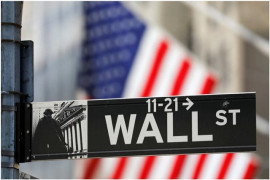1731052413-0/BeFunk_§_]-(52)1731052413-0.jpg)
As Donald Trump prepares for a possible return to the White House, his transition team is compiling a shortlist of candidates for key financial agency positions, including the Securities and Exchange Commission (SEC) and banking regulators.
Among those under consideration is Dan Gallagher, the current Chief Legal Officer at Robinhood and a former SEC commissioner from 2011 to 2015.
Gallagher, a well-known figure in the cryptocurrency sector, has garnered support from industry executives who donated heavily to Trump's 2024 campaign.
Gallagher is currently seen as a leading candidate for the SEC chairmanship, a position he previously held from 2011 to 2015.
He is a popular choice among crypto advocates, especially as Trump's campaign has courted cryptocurrency donations with promises to overhaul the SEC’s regulatory stance.
Under current SEC Chair Gary Gensler, there has been increased scrutiny on cryptocurrency markets, with many crypto executives pushing for a more business-friendly regulatory environment.
Trump’s campaign has signaled support for policies that would end the SEC’s tough stance on crypto, which could see Gallagher’s selection as a favorable outcome for the industry.
Other potential candidates for the SEC chair role include Paul Atkins, a former Republican SEC commissioner and CEO of Patomak Global Partners, and Robert Stebbins, a former SEC general counsel during Trump’s first term.
These individuals are also known for their conservative regulatory views and could signal a shift toward deregulation of financial markets under a second Trump administration.
In addition to the SEC, Trump’s team is considering candidates for top banking regulatory roles. These include Michelle Bowman, a Federal Reserve governor with a background in community banking, and Travis Hill, the Republican vice chairman of the Federal Deposit Insurance Corporation (FDIC).
Both Bowman and Hill have criticized the Biden administration’s banking regulations, particularly the Basel III capital rules that require banks to hold more capital reserves to absorb potential losses.
If appointed, these figures could push for the rollback of such regulations and create a more favorable environment for the banking industry.
Trump’s approach to banking regulations is expected to ease the burdens placed on financial institutions during the Biden administration.
In particular, the deregulatory measures he championed during his first term, including tax cuts and looser oversight of mergers and acquisitions, are likely to be revisited.
Wall Street executives have expressed optimism about a Trump administration’s business-friendly policies, predicting an uptick in corporate profits and increased deal-making activity.
However, not everyone is celebrating the potential return of Trump’s policies.
Critics, including some renewable energy advocates and legal professionals, have expressed concerns over the potential reversal of environmental regulations and the risks associated with increased deficits.
Trump’s tax cuts and deregulation agenda could add significantly to the national deficit, with estimates suggesting a $7.5 trillion increase over the next decade.
While many on Wall Street are hopeful for a more predictable regulatory environment, some worry about Trump’s unpredictability, particularly in areas like trade tariffs, fiscal policy, and immigration.
These developments come amidst United Nations concerned over potential US funding cuts and withdrawals from key international agreements.
Furthermore, Trump announced on Thursday that Susie Wiles, one of his campaign managers, will serve as White House chief of staff.
The return of Trump’s populist approach could also lead to stricter visa policies, potentially impacting international workers and companies reliant on foreign talent.
As Trump’s team moves forward with selecting candidates for key financial roles, the market is bracing for the potential shifts in regulation and policy that could follow his second term.
The full implications of these changes will depend on the final choices made for these critical positions.
1730267052-0/Olivia-Rodrigo-(2)1730267052-0-405x300.webp)

1719745858-0/BeFunky-collage-(1)1719745858-0-165x106.webp)
1731066636-0/khloe-(1)1731066636-0-165x106.webp)

1731063165-0/BeFunk_§_]-(55)1731063165-0.jpg)

1725004899-0/BeFunky-(20)1725004899-0-270x192.webp)

1731050816-0/BeFunk_§_]-(51)1731050816-0.jpg)


1731046534-0/trump-(22)1731046534-0-270x192.webp)






COMMENTS
Comments are moderated and generally will be posted if they are on-topic and not abusive.
For more information, please see our Comments FAQ